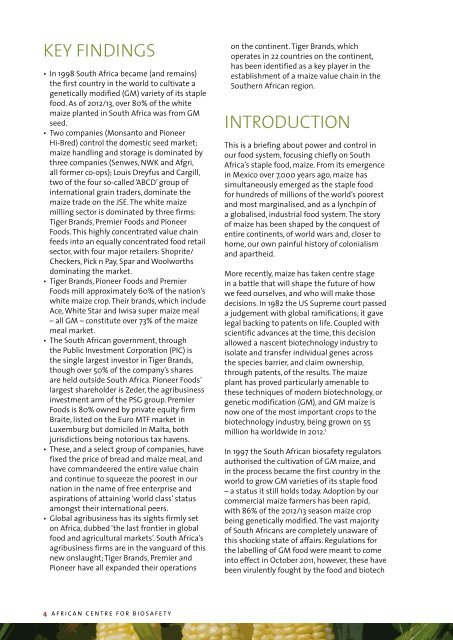GM-Maize-Report
GM-Maize-Report
GM-Maize-Report
Create successful ePaper yourself
Turn your PDF publications into a flip-book with our unique Google optimized e-Paper software.
KEY FINDINGS• In 1998 South Africa became (and remains)the first country in the world to cultivate agenetically modified (<strong>GM</strong>) variety of its staplefood. As of 2012/13, over 80% of the whitemaize planted in South Africa was from <strong>GM</strong>seed.• Two companies (Monsanto and PioneerHi-Bred) control the domestic seed market;maize handling and storage is dominated bythree companies (Senwes, NWK and Afgri,all former co-ops); Louis Dreyfus and Cargill,two of the four so-called ‘ABCD’ group ofinternational grain traders, dominate themaize trade on the JSE. The white maizemilling sector is dominated by three firms:Tiger Brands, Premier Foods and PioneerFoods. This highly concentrated value chainfeeds into an equally concentrated food retailsector, with four major retailers: Shoprite/Checkers, Pick n Pay, Spar and Woolworthsdominating the market.• Tiger Brands, Pioneer Foods and PremierFoods mill approximately 60% of the nation’swhite maize crop. Their brands, which includeAce, White Star and Iwisa super maize meal– all <strong>GM</strong> – constitute over 73% of the maizemeal market.• The South African government, throughthe Public Investment Corporation (PIC) isthe single largest investor in Tiger Brands,though over 50% of the company’s sharesare held outside South Africa. Pioneer Foods’largest shareholder is Zeder, the agribusinessinvestment arm of the PSG group. PremierFoods is 80% owned by private equity firmBraite, listed on the Euro MTF market inLuxemburg but domiciled in Malta, bothjurisdictions being notorious tax havens.• These, and a select group of companies, havefixed the price of bread and maize meal, andhave commandeered the entire value chainand continue to squeeze the poorest in ournation in the name of free enterprise andaspirations of attaining ‘world class’ statusamongst their international peers.• Global agribusiness has its sights firmly seton Africa, dubbed ‘the last frontier in globalfood and agricultural markets’. South Africa’sagribusiness firms are in the vanguard of thisnew onslaught; Tiger Brands, Premier andPioneer have all expanded their operationson the continent. Tiger Brands, whichoperates in 22 countries on the continent,has been identified as a key player in theestablishment of a maize value chain in theSouthern African region.INTRODUCTIONThis is a briefing about power and control inour food system, focusing chiefly on SouthAfrica’s staple food, maize. From its emergencein Mexico over 7,000 years ago, maize hassimultaneously emerged as the staple foodfor hundreds of millions of the world’s poorestand most marginalised, and as a lynchpin ofa globalised, industrial food system. The storyof maize has been shaped by the conquest ofentire continents, of world wars and, closer tohome, our own painful history of colonialismand apartheid.More recently, maize has taken centre stagein a battle that will shape the future of howwe feed ourselves, and who will make thosedecisions. In 1982 the US Supreme court passeda judgement with global ramifications; it gavelegal backing to patents on life. Coupled withscientific advances at the time, this decisionallowed a nascent biotechnology industry toisolate and transfer individual genes acrossthe species barrier, and claim ownership,through patents, of the results. The maizeplant has proved particularly amenable tothese techniques of modern biotechnology, orgenetic modification (<strong>GM</strong>), and <strong>GM</strong> maize isnow one of the most important crops to thebiotechnology industry, being grown on 55million ha worldwide in 2012. 1In 1997 the South African biosafety regulatorsauthorised the cultivation of <strong>GM</strong> maize, andin the process became the first country in theworld to grow <strong>GM</strong> varieties of its staple food– a status it still holds today. Adoption by ourcommercial maize farmers has been rapid,with 86% of the 2012/13 season maize cropbeing genetically modified. The vast majorityof South Africans are completely unaware ofthis shocking state of affairs. Regulations forthe labelling of <strong>GM</strong> food were meant to comeinto effect in October 2011, however, these havebeen virulently fought by the food and biotech4 AFRICAN CENTRE FOR BIOSAFETY




